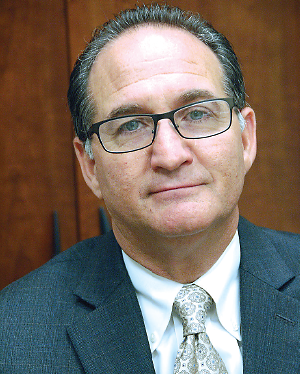Judges Get Help Handling Mentally Ill Defendants
Abstract
A Florida judge heads a program to educate U.S. judges on managing criminal cases involving defendants with mental illness.
The Judges Leadership Initiative has begun educating judges and psychiatrists about the interface between the criminal justice system and the psychiatric community, said Judge Steven Leifman, J.D., of Florida’s 11th Judicial Circuit.

Miami Judge Steven Leifman, J.D., is working with the American Psychiatric Foundation and others to educate judges about the best ways to manage criminal cases with defendants who have mental illness.
Leifman is spearheading the initiative with the help of a grant from Janssen Pharmaceutical Companies through the American Psychiatric Foundation (APF), in cooperation with the Council of State Governments’ Justice Center.
“We’re developing a curriculum for judges and psychiatrists to work collaboratively on ways to handle cases in court,” said Leifman in a recent interview at APA headquarters.
The initiative sponsored a session at the APA Institute on Psychiatric Services in New York in October 2012, in which a group of judges and psychiatrists were trained to train other judges to better deal with defendants who have a mental illness.
As a next step, the Judges Leadership Initiative is developing a series of videos showing judges just how to manage a case in court when it involves an individual with mental illness. The videos will present vignettes or case studies demonstrating common behaviors of people who have a mental illness.
“We welcome participation by psychiatrists,” he said. “We’re judges, not doctors, and we don’t want to pretend to be, and we really need the help from the psychiatric community on how we should be handling these individuals.”
Leifman also wants to encourage judges to collaborate with others to make significant changes in the judicial system and in their communities.
“One way to do this is to work with all the stakeholders in the community,” he said. “So we’re teaching judges how to bring all those groups together and educate law-enforcement personnel about how to recognize someone in a crisis, how to deescalate situations, and where to take [mentally ill individuals] as opposed to arresting them.”
In Miami-Dade County, where Leifman presides, more than 3,600 officers have been trained in crisis-intervention policing, he said. Last year, two agencies in the county handled more than 10,000 mental health calls and, remarkably, made only 45 arrests.
“It shows that if you educate people and teach them about mental illnesses, you can make a significant improvement,” he said.
Leifman also works to teach judges about diversion programs so that when people with serious mental illnesses are arrested (and the crime is not too serious) alternatives can divert defendants from the criminal justice system and keep them in the community and in the mental health system. The goal is to avoid rearrest and unnecessary hospitalization or incarceration of these defendants.
Some people with mental illness also face criminogenic risk factors that increase their chances of getting arrested, such as co-occurring substance use disorders, illiteracy, living in areas with high crime rates, or hanging around with people who commit crimes.
A demonstration study supported by a grant from the Bristol Myers Squibb Foundation through the APF will assess the effects of an intervention on such individuals.
The program is now under way in Miami-Dade County. Two groups of 50 individuals with criminal records will be compared. One group will receive mental health treatment as usual, while the other will get the same plus a cognitive-behavioral therapy program designed to address their criminogenic issues, said Leifman.
Leifman wants to address another longer-term concern—the fact that many laws pertaining to involuntary hospitalization are at least 40 years old.
“All are based on old neurological science, old ideas, and old stereotypes, and none of it really applies today,” he emphasized. “If we would start thinking about this as a medical issue rather than as a justice issue we could keep a lot more people out of jail.”
He wants to get both the legal and forensic psychiatry communities talking about this issue, with the goal of ultimately producing a new model law.
“Maybe we can do a joint article for a major law review and a medical journal on why new laws are needed,” he said. “The laws now based on dangerousness, but they should be based on treatment.”
Leifman recently received the Productive Life Award from the Brain and Behavior Research Foundation for his contributions to helping people recover from mental illness. ■
More about the Judges Leadership Initiative is posted at http://consensusproject.org/JLI/. To access an audio interview with Leifman, go to http://www.psychnews.org/update/audio/Leifman.mp3



